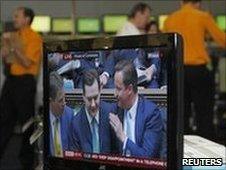Mixed Scottish business reaction to Budget
- Published

Chancellor George Osborne spoke for about an hour in his first Budget
Scottish business leaders have given a mixed reaction to the UK Budget unveiled by the chancellor.
Popular measures from George Osborne have included cutting levels of corporation tax, particularly for small businesses next year.
But the business community has reacted unfavourably to news of a VAT rise from 17.5% to 20% from 4 January 2010.
And there was little cheer for the video gaming industry as the chancellor reversed planned tax breaks.
The Scottish Chambers of Commerce said the rise in VAT would "undoubtedly cause concerns" in Scotland's retail and tourism sectors as it would serve to dampen consumer demand in the economy next year".
However, chief executive Liz Cameron welcomed plans to reduce headline levels of corporation tax and cut the rate of corporation tax for small companies to 20%.
She continued: "Of serious concern, though, is the lack of support the UK government has shown to the Scottish video games industry.
"With home-grown developers such as Dundee's Realtime Worlds and Ruffian Games about to launch major new products across the world over the coming weeks, the government have made a bad decision in reversing the planned tax breaks for one of our key industries of the future."
The Scottish Building Federation took a negative view of the Budget, in particular the rise in VAT early next year.
Chief executive Michael Levack said: "I can find nothing that would help ease the availability of affordable credit to building firms or to expanding businesses and home buyers that should be driving future construction demand.
"For the construction sector in particular, increasing VAT to 20% is a retrograde step which plays into the hands of cash-in-hand cowboys by increasing their competitive advantage over legitimate building firms.
"The new higher rate of VAT will be a further setback to sustainable recovery in the construction industry."
VAT worries
Meanwhile, Russell Hills, head of tax at KPMG in Scotland, said retailers would be relieved that the widely trailed VAT increase would not come in until after the Christmas and New Year sales period.
He added: "But 2011 could be a hard year on the high street as prices go up to accommodate the new rate."
The Federation of Small Businesses in Scotland (FSB) said it welcomed many of the measures in the Budget, but expressed concern that rises in Employer National Insurance Contributions were not completely reversed.
It also said it was worried about the possible impact of a VAT increase.
Andy Willox, FSB Scottish policy convener, said the increase in VAT would pose problems to many small firms who might find it difficult to absorb the financial and administrative costs associated with the move.
He added: "We welcome moves to give a national insurance holiday to Scottish business start-up firms, but believe there may be an opportunity to expand the scheme and boost employment in firms already trading.
"Further, we need to see a full reversal of the employers' national insurance contributions increases to ensure that we boost employment amongst the small business community."
The Insitute of Directors (IoD) took a positive view of the Budget.
David Watt, executive director of the IoD in Scotland, said Mr Osborne had "faced up to the challenge".
"The economy needed faster and deeper deficit reduction and that's exactly what the chancellor has delivered," he said.
"Equally important to the scale of deficit reduction is the way it is done. Here again the Chancellor has chosen the right route, by concentrating overwhelmingly on closing the fiscal gap by lower spending instead of higher taxation," added Mr Watt.
- Published22 June 2010
- Published22 June 2010
- Published23 June 2010